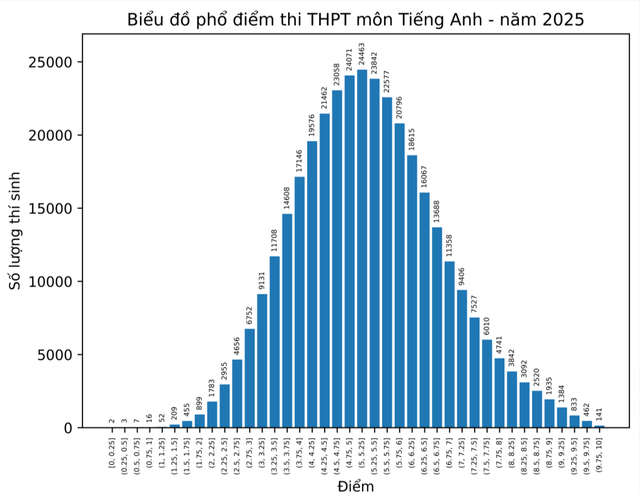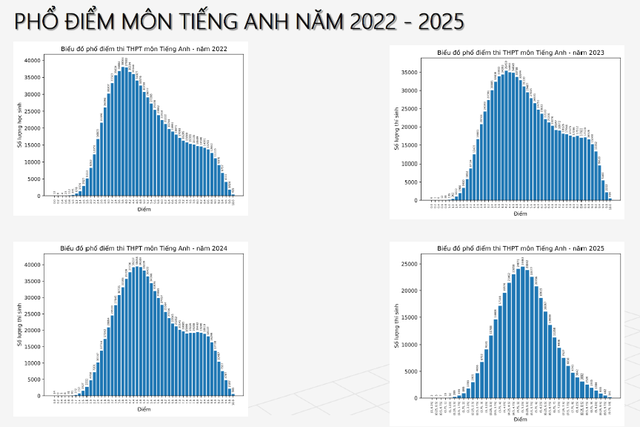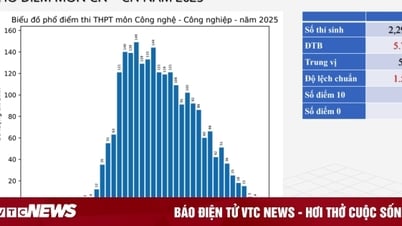A good score distribution does not mean a good test.
On the evening of July 15, after Thanh Nien Newspaper published the article "Experts say they are surprised by the beautiful scores of the English subject", Mr. Pham Gia Bao, an IELTS test preparation teacher in Hanoi , sent the newspaper some opposing opinions.
According to Mr. Bao, the English exam score distribution is indeed good, but that does not mean this year's English exam is a good exam.

English exam score distribution for 2025 high school graduation exam
PHOTO: MINISTRY OF EDUCATION AND TRAINING
Teacher Bao shared: "The score distribution is really good. This fairly even distribution shows that the test classified candidates well, but it is not necessarily because the test was done well."
According to Mr. Bao, the biggest problem with the test is the difference between the knowledge in the curriculum and the knowledge in the test. The difference is too big. Recently, the press as well as the online community have published too many articles reflecting that even teachers who have taken the IELTS test 4 times and got 9.0 cannot get 10 points, or native English speakers have tried the test and said the test is tricky.
The person who created the test confused the concept of "assessing students' language ability" with "puzzling students just to classify them". The consequence is that it creates social injustice because most of the students with high scores, except for a small number who are talented, self-study well, and inherently have good qualities, the rest are mainly from big cities, whose families can afford to send their children to extra classes. If they only study hard according to the program, they cannot get high scores.
Single peak spectrum is not necessarily better than double peak spectrum
Mr. Bao said: "The Ministry of Education and Training's experts said that the score distribution no longer has two peaks and implicitly considered that a good thing. In my opinion, this statement is unreasonable. The fact that the score distribution has two peaks is not enough to say whether the test is good or bad, but the context must also be considered."
According to Mr. Bao, a 2-peak spectrum can be a sign of one of the following problems:
If the test is too unbalanced, such as having unreasonably difficult sections or being biased towards certain types of questions, it will result in a low-scoring peak and a high-scoring peak, while the middle range of scores is very few candidates achieve.

This year's English score distribution is normal but does not necessarily reflect a good test.
PHOTO: MINISTRY OF EDUCATION AND TRAINING
Uneven teaching quality: the double-peaked score spectrum sometimes shows a large difference between students in different regions, schools, or learning conditions. For example, students in the city who study a lot and practice the questions carefully get high scores; students in remote areas who have difficulty accessing knowledge get low scores.
Many candidates get lucky by guessing and studying by heart: if the exam questions are "right on target" or students practice for the exam in the same way, then one group does very well, while the other group fails because they don't study properly, this will also create two peaks.
Mr. Bao asked a question, then answered himself: "So, does the distribution of scores to only one peak really solve the above problems?
Students guessing is the nature of multiple choice tests, no one can say where students actually did it and where they guessed. The difference in scores between urban and rural areas is still an inherent problem (the nature of society) that has not changed, but is even more evident.
The fact that the English exam content goes beyond the framework of the general education program has existed for decades is not a new problem. It's just that this year's exam questions are more difficult to stand out, reflecting this reality more clearly."
Two major problems of teaching English in schools
Mr. Bao said that teaching English in high schools still has two big problems.
One is that classroom teaching, especially in public schools, is often not really good enough. The reasons are both objective and subjective. The number of students is too large. The range of student levels is too wide, in the same class there are students with IELTS 7.0 or higher (higher than the teacher), while there are students with no foundation.
Although the curriculum is designed quite well (covering all four skills of listening, speaking, reading and writing), in reality teachers cannot "carry" it. Teachers can only teach the easy part, which is grammar. As for vocabulary and now reading, most students are "dumb", "deaf" and cannot write, except for a very few who study on their own.
Second, because our exams are still on paper and in multiple-choice format, the result is that students do not need to learn listening, speaking, and writing, because what is the point of learning when it does not affect the exam score?
Not to mention that no matter how well designed a test is, it still cannot eliminate students from learning tricks or doing things haphazardly.
This is why international exams like IELTS and many others are more prestigious and considered more reliable. Not only because the quality of those exams is more consistent (less likely to be difficult in the previous exam and easier in the next), but also because their test format is less multiple choice and reflects language ability more accurately.
Change is needed to avoid wasting social resources.
Mr. Bao said: "Back to our high school graduation exam, up to now, candidates still do not have to do the listening test, a very basic skill, so how can we evaluate the "language ability" of the learner?
Granted, deploying equipment and logistics is complicated and expensive, but if the real goal is to improve the qualityof education , specifically in this case language, not just English but foreign languages in general, then that is the direction to go. Now sitting around analyzing score distributions or arguing whether this reading passage has a difficult or easy sentence is going in the wrong direction."
According to Mr. Bao, the advantage of this year's English exam is that there have been changes, with fewer tricky questions about vocabulary and grammar. The fact that the exam focuses on reading comprehension is really useful for learners not only from a learning perspective but also gives them a long-term useful skill in real life, which is reading and understanding real-life information.
The exam questions have changed in the right direction (less riddles, more focus on reading comprehension), but the Ministry of Education and Training focuses too much on getting many 9s, 10s, or some kind of score range, without looking at whether the exam can truly reflect the students' language ability!
The exam is not only a test to assess students' abilities, but in fact it is also their destination. The exam score affects their university admission process. If the exam is good, students will try to practice good skills (listening, speaking, reading, writing).
Bad test papers only make students waste time studying, while their skills are still developed incorrectly or have no practical application. This wastes social resources and money, and has poor practical results.
Source: https://thanhnien.vn/giao-vien-luyen-thi-ielts-phan-bien-ve-danh-gia-pho-diem-mon-tieng-anh-dep-185250715220508183.htm





































































































Comment (0)